2023届高考英语时态基础学习课件(共31张PPT)
文档属性
| 名称 | 2023届高考英语时态基础学习课件(共31张PPT) |  | |
| 格式 | zip | ||
| 文件大小 | 281.9KB | ||
| 资源类型 | 教案 | ||
| 版本资源 | 通用版 | ||
| 科目 | 英语 | ||
| 更新时间 | 2022-12-31 21:56:44 | ||
图片预览




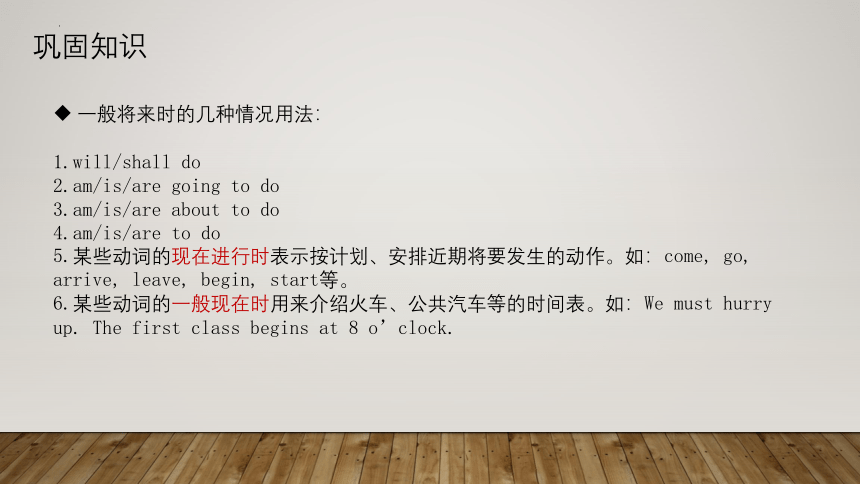
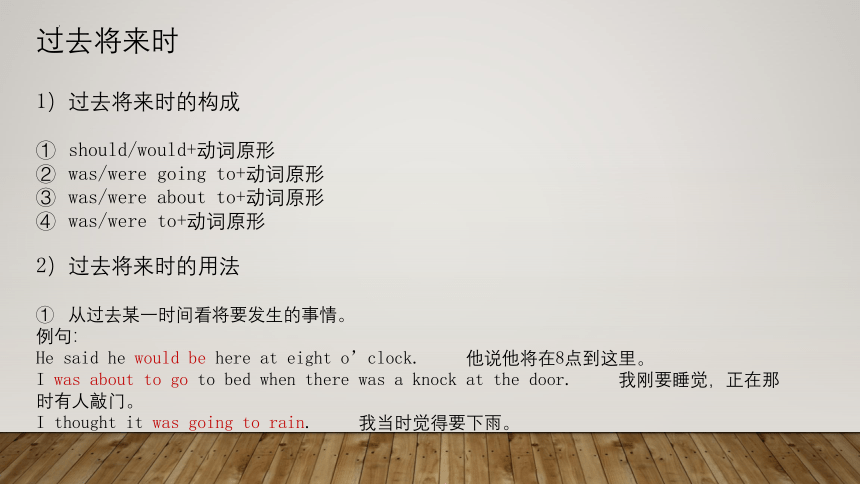
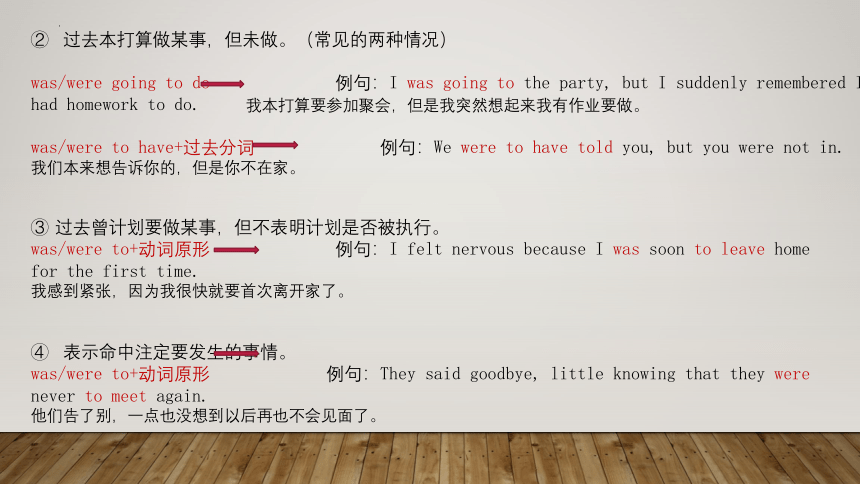

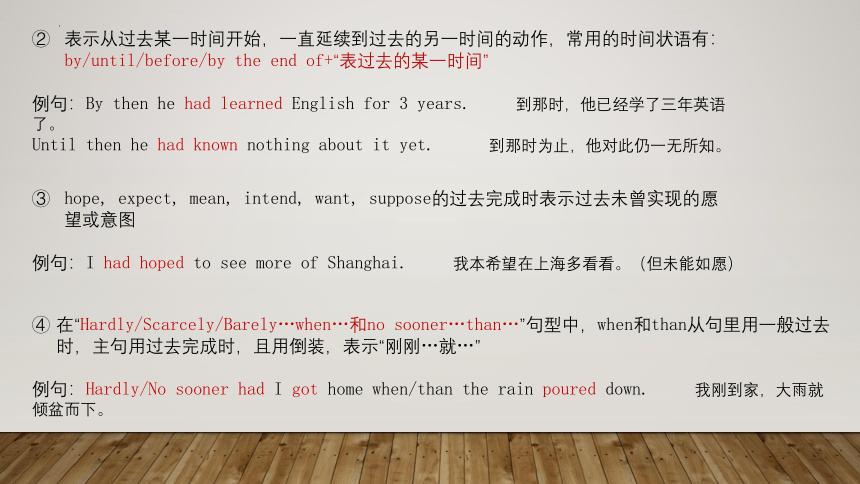
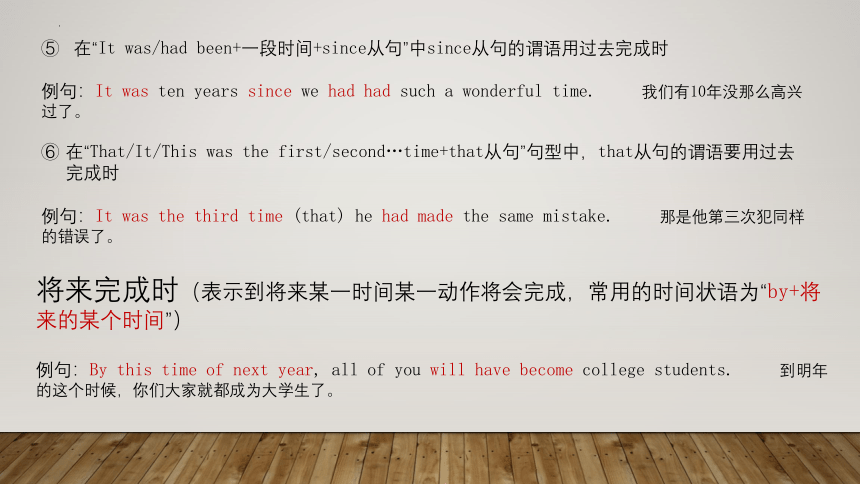
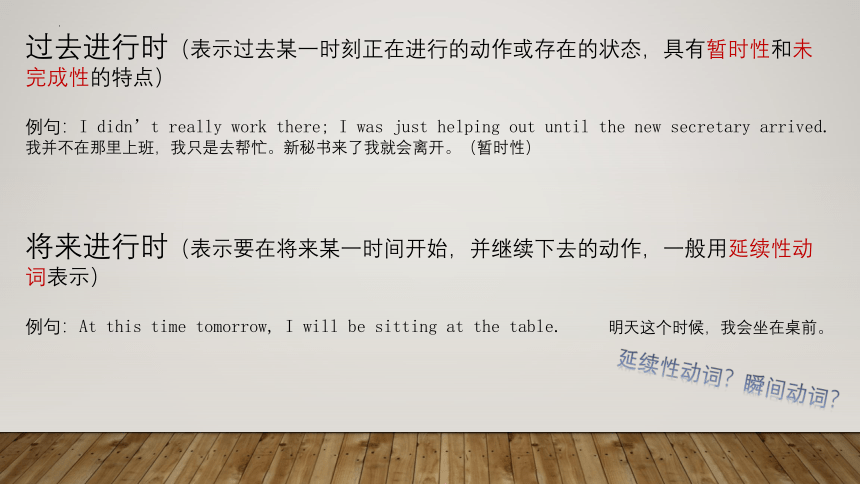
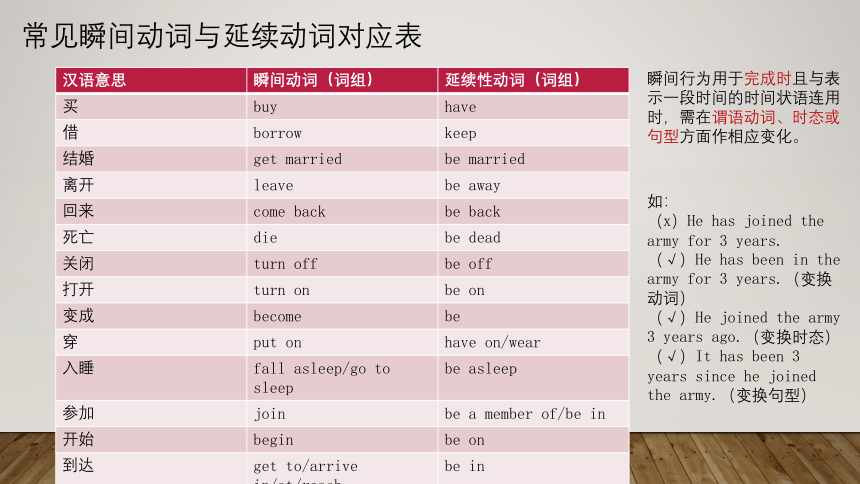
文档简介
(共31张PPT)
高中英语时态基础学习
学习目标
能掌握各种时态在不同句型的用法。
学习重点
主谓一致、动词时态呼应(主将从现)的用法。
时态的分类
一般体 完成体 进行体 完成进行体
现在时 一般现在时 现在完成时 现在进行时 现在完成进行时
过去时 一般过去时 过去完成时 过去进行时 过去完成进行时
将来时 一般将来时 将来完成时 将来进行时 将来完成进行时
过去将来时 一般过去将来时 过去将来完成时 过去将来进行时 过去将来完成进行时
时态的基本构成形式
一般时 完成时 进行时 完成进行时
现在 do/does have/has done am/is/are doing have/has been doing
过去 did had done was/were doing had been doing
将来 will/shall do will/shall have done shall/will be doing shall/will have been doing
过去将来 should/would do should/would have done should/would be doing should/would have been doing
巩固知识
一般将来时的几种情况用法:
1.will/shall do
2.am/is/are going to do
3.am/is/are about to do
4.am/is/are to do
5.某些动词的现在进行时表示按计划、安排近期将要发生的动作。如:come, go, arrive, leave, begin, start等。
6.某些动词的一般现在时用来介绍火车、公共汽车等的时间表。如:We must hurry up. The first class begins at 8 o’clock.
过去将来时
1)过去将来时的构成
should/would+动词原形
was/were going to+动词原形
was/were about to+动词原形
was/were to+动词原形
2)过去将来时的用法
从过去某一时间看将要发生的事情。
例句:
He said he would be here at eight o’clock. 他说他将在8点到这里。
I was about to go to bed when there was a knock at the door. 我刚要睡觉,正在那时有人敲门。
I thought it was going to rain. 我当时觉得要下雨。
过去本打算做某事,但未做。(常见的两种情况)
was/were going to do 例句:I was going to the party, but I suddenly remembered I had homework to do. 我本打算要参加聚会,但是我突然想起来我有作业要做。
was/were to have+过去分词 例句:We were to have told you, but you were not in.
我们本来想告诉你的,但是你不在家。
过去曾计划要做某事,但不表明计划是否被执行。
was/were to+动词原形 例句:I felt nervous because I was soon to leave home for the first time.
我感到紧张,因为我很快就要首次离开家了。
表示命中注定要发生的事情。
was/were to+动词原形 例句:They said goodbye, little knowing that they were never to meet again.
他们告了别,一点也没想到以后再也不会见面了。
过去完成时(表示到过去某个确定的时间点已完成某事)
用法:
一件事情发生在过去,而另外一件事先于它发生(即表示过去的过去),那么发生在前的动作要用过去完成时。可以画横轴辅助解答题目
过去 现在 将来
发生在过去以前的事情,就用过去完成时
时间轴
例句:She had learned some English before she came to the institute. 她在来这个机构之前就已经学过一些英语了。
He said that he had been abroad for 3 years. 他说他在国外待了三年了。
表示从过去某一时间开始,一直延续到过去的另一时间的动作,常用的时间状语有:by/until/before/by the end of+“表过去的某一时间”
例句:By then he had learned English for 3 years. 到那时,他已经学了三年英语了。
Until then he had known nothing about it yet. 到那时为止,他对此仍一无所知。
hope, expect, mean, intend, want, suppose的过去完成时表示过去未曾实现的愿望或意图
例句:I had hoped to see more of Shanghai. 我本希望在上海多看看。(但未能如愿)
在“Hardly/Scarcely/Barely…when…和no sooner…than…”句型中,when和than从句里用一般过去时,主句用过去完成时,且用倒装,表示“刚刚…就…”
例句:Hardly/No sooner had I got home when/than the rain poured down. 我刚到家,大雨就倾盆而下。
在“It was/had been+一段时间+since从句”中since从句的谓语用过去完成时
例句:It was ten years since we had had such a wonderful time. 我们有10年没那么高兴过了。
在“That/It/This was the first/second…time+that从句”句型中,that从句的谓语要用过去完成时
例句:It was the third time (that) he had made the same mistake. 那是他第三次犯同样的错误了。
将来完成时(表示到将来某一时间某一动作将会完成,常用的时间状语为“by+将来的某个时间”)
例句:By this time of next year, all of you will have become college students. 到明年的这个时候,你们大家就都成为大学生了。
过去进行时(表示过去某一时刻正在进行的动作或存在的状态,具有暂时性和未完成性的特点)
例句:I didn’t really work there; I was just helping out until the new secretary arrived. 我并不在那里上班,我只是去帮忙。新秘书来了我就会离开。(暂时性)
将来进行时(表示要在将来某一时间开始,并继续下去的动作,一般用延续性动词表示)
例句:At this time tomorrow, I will be sitting at the table. 明天这个时候,我会坐在桌前。
延续性动词?瞬间动词?
常见瞬间动词与延续动词对应表
汉语意思 瞬间动词(词组) 延续性动词(词组)
买 buy have
借 borrow keep
结婚 get married be married
离开 leave be away
回来 come back be back
死亡 die be dead
关闭 turn off be off
打开 turn on be on
变成 become be
穿 put on have on/wear
入睡 fall asleep/go to sleep be asleep
参加 join be a member of/be in
开始 begin be on
到达 get to/arrive in/at/reach be in
瞬间行为用于完成时且与表示一段时间的时间状语连用时,需在谓语动词、时态或句型方面作相应变化。
如:
(x)He has joined the army for 3 years.
(√)He has been in the army for 3 years.(变换动词)
(√)He joined the army 3 years ago.(变换时态)
(√)It has been 3 years since he joined the army.(变换句型)
现在完成进行时
形式:have/has+been+doing
用法:
动作发生在过去,持续到现在且现在还在进行
例句:He has been learning English for 6 years. 他学英语已经6年了。(强调到现在还在学)
现在完成进行时是现在完成时和现在进行时的组合,因此,它既具备现在完成时的特征,又具备现在进行时的特征,如:它具备进行体的“未完成性、暂时性、感彩”的特点
例句:It has been raining for 3 days. 已经下了3天雨了。(强调说话者“抱怨”的感彩)
练一练
Happy birthday! By this time of next year, you_____(turn)18.
I _____(think)you would come the next day, but you didn’t.
This is the first time that he_____(pass)the exam.
Hardly _____(have)we started when the car got a flat tyre.
will have turned
had thought
has passed
had
重点难点
(一)动词时态的呼应
1.主将从现
所谓主将从现,即主句表将来(不一定为一般将来时,祈使句、“情态动词+动词原形”也可表将来),从句(包括时间、条件、让步状语从句)用现在时(不一定是一般现在时,现在进行时、现在完成时也在这类从句中表示将来)
例句:Whatever you say, I will not change my mind. 无论你说什么,我都不会改变主意。
If she is still waiting, tell her to go home. 如果她还在等,就让她回家。
I will go with you as soon as I have finished my work. 我做完工作就和你一起去。
做题需要结合句子意思及语境!
2.含宾语从句的句子的时态一致问题
宾语从句中的动词时态常受主句谓语时态的制约,如果主句谓语为现在时或将来时,宾语从句中的谓语可以不受影响。
He says (that)
his father is a teacher. 他说他父亲现在是老师。
His father was a teacher. 他说他父亲过去是老师。
His father will become a teacher. 他说他父亲将要当老师。
如果主句的谓语动词是过去时,宾语从句的谓语动词一般要用过去的某种时态,即一般过去时、过去进行时、过去完成时、过去将来时等。如:
I thought (that)
he was a smart boy.(was与thought同时发生)
he was sleeping.(thought发生时,sleep正在进行)
he had got well.(get well先于thought发生)
he had been learning French for at least 4 years.(learn French发生在thought之前,并延续到了thought这个动作,且在thought时还在进行)
he would find a job soon.(find a job发生在thought之后)
当主句为过去时,宾语从句有明确的表过去的时间状语时,可以不用过去完成时而用一般过去时。
如:I knew he was born in 1991.
当宾语从句表达真理时,谓语动词不必变为过去时,而继续采用一般现在时态。
如:This proved that the earth is round.
Pay attention!
例题:
1.The teacher told us that the Yangtze River _____(originate)in Qinghai.
2.He said he _____(leave)a few days later.
originates
was leaving/would leave
(二)主谓一致
主谓一致即在句子中谓语动词的数必须和主语的数保持一致。一般可以根据三个原则来确定:
重点难点
语法一致:主语的单、复数决定谓语动词的单、复数
意义一致:形单意复或形复意单的名词作主语,谓语动词要根据主语的意义决定
就近一致:谓语动词要和离它最近的主语在数上保持一致
语法一致
用法 例句
主语是单数,谓语动词用单数;主语是复数,谓语动词用复数 The results of the research are to be published soon. 研究结果不久将发表。
复合不定代词someone, anyone, everyone, nobody/no one, something, anything, everything, nothing做主语,谓语动词用单数 If anyone sees Lisa, ask her to call me. 如果有人看到Lisa,让她给我打个电话。
Nothing is impossible to a willing heart. 世上无难事,只怕有心人。
each of+名词复数或them/us/you作主语时,谓语动词用单数形式,但“we, you, they或名词复数+each”作主语时,谓语动词用复数形式 Each of the students has an apple. 这些学生每人有一个苹果。(不定代词each作主语)
The students each have an apple. 这些学生每人有一个苹果。(The students作主语,each作同位语)
代词all作主语:如果指人,谓语动词用复数;如果指事物或现象,谓语动词通常用单数 All are equal before the law. 法律面前人人平等。
All is well that ends well. 结局好一切都好。
不定式、动名词或从句作主语时,谓语动词通常用单数 Having to change trains is a small inconvenience.
Many a/the whole/each/every/either/neither+单数名词作主语时,谓语动词用单数 Many a page in this book is missing. 这本书缺了许多页。
The whole nation is in deep sorrow. 整个国家沉浸在悲痛之中。
例题:
1.His suggestion _____(have)been accepted.
2.To say you were ignorant of the rules _____(be)no excuse.
3.How to earn daily bread by my pen _____ (be)then the problem.
has
is
was
意义一致
用法 例句
形式为单数但意义为复数概念的police, cattle等作主语时,谓语动词用复数 The police have not made any arrests.
警方未逮捕任何人。
表示一类人/物的the poor/rich/dead/injured/wounded等和“the+姓氏复数”做主语时,谓语动词用复数 The rich are to help the poor. 富人应该帮助穷人。
The Greens are going to London. 格林一家要去伦敦。
表示某国人的总称的the Chinese, the British, the Irish等作主语时,谓语动词用复数 The Chinese are hard-working. 中国人民是勤劳的。
诸如maths, physics, politics, news等以“s”结尾却表示单数或不可数概念的名词作主语时,谓语动词用单数 Physics is my favorite subject. 物理是我最喜欢的科目。
Bad news has wings. 坏事传千里。
单复数同形的名词sheep, deer, means, works(工厂)等作主语,谓语动词的数与实际意义一致 3 sheep are eating grass there. 3只羊在那里吃草。
A sheep is lying there. 有只羊正躺在那里。
集体名词family, class, crew, team, group, public, audience, crowd, government, committee等作主语时,动词的单复数要根据主语所指的意义而定。当集体名词作为一个整体看待时,谓语动词用单数;如果指其中各个成员时,谓语动词用复数 The class consists of 25 boys and 20 girls. 这个班由25个男生和20个女生组成。(强调class这一个整体)
The class are doing experiments. 全班同学正在做实验。(强调class里的各个成员)
例题:
1.The cattle _____(be)eating grass on the hill now.
2.Not every means _____(be)useful.
3.The English _____(be)proud of their sense of humor.
就近一致(就近原则)
or, either…or…, neither…nor…, not only…but also…, not…but…在句子中连接并列主语的时候或者在there be句型中,谓语动词要和离它最近的主语保持一致。
例句:
Not his parents but he doesn’t want to go. 不是他的父母不想去而是他不想去。
Neither you nor I am wrong. 你和我都没错。
Not only the students but also the teacher wishes for a holiday. 不仅是学生,老师也盼望假期。
There is a cup of tea and some apples on the table. 桌上有一杯茶和一些苹果。
例题:
1._____ (be)either you or he fit for the job
2.Not you but I _____(be)responsible for this.
3._____(be)not only the students but also their teacher required to attend the meeting
Are
am
Are
are
is
are
主谓一致的几个难点
一. 并列主语的主谓一致
两个单数可数名词或不可数名词用and连接,表示两个不同的概念时,谓语动词用复数。
例句:
Tom and Jack were close friends. Tom和Jack是亲密的朋友。
Steam and ice are different forms of water. 蒸汽和冰是水的不同形式。
两个单数可数名词用and连接,表示同一人、同一物或同一个概念,或表示不可分的整体时,谓语动词仍用单数
例句:
The singer and dancer is to attend our evening party. 那位歌舞演员将参加我们的晚会。
被every, each, many a, no等限定的名词由and连接时,谓语动词仍用单数
例句:
Many a teacher and (many a) student has seen the film. 许多老师和学生看过这部电影。
一个单数可数名词或不可数名词被几个用and连接的并列形容词所修饰时,可以指一件事或几件事,这种名词作主语,要根据意义一致的原则决定谓语动词的单复数形式
例句:
Simple and plain living is a fine quality. 生活简朴是一种优良的品质。
English and American literature are appealing to her. 英国文学和美国文学都对她有吸引力。
由and连接的两个what从句作主语时,要根据意义一致的原则决定谓语动词的单复数形式
例句:
What he says and does do not agree. 他言行不一致。
What he says and does does not concern me. 他的言行与我无关。
在含“名词或代词+with, along with, together with, as well as, rather than, but, except/not等+名词或代词”结构的句子中,谓语动词的数应该和第一个名词或代词保持一致。(即就远原则)
例句:
Tom as well as two of his friends was invited to the party. Tom以及他的两个朋友一起被邀请参加聚会了。
Nobody but one teacher and three students was in the laboratory. 只有一个老师和三个学生在实验室里。
由两部分构成的表示物体的名词,如trousers, pants, jeans, glasses, shoes等作主语时,谓语动词常用复数形式。但如果这类名词前用了a pair of/two/three…pairs of来修饰,谓语动词的单复数往往取决于pair的单复数形式。
如:
These trousers need cleaning.
This pair of trousers needs cleaning.
The 2 pairs of trousers are mine. 这两条裤子是我的。
这条裤子需要洗。
例题:
1.Compasses _____ (be)usually used to draw circles.
2.That pair of compasses _____(be)lost.
3.Many a good man _____(have)been destroyed by drink.
4.The writer and translator _____(be)delivering a speech in our school now.
5.Tom, not the students, _____(have)gone there.
6.Mary, along with her sisters, _____(attend)the conference regularly.
are
is
has
is
has
attends
数词与量词(+名词)作主语时的主谓一致
表示时间、重量、距离、价格、体积等名词的复数作主语时,通常作整体看待,后接单数谓语动词
例句:
Twenty years is a long time in one’s life. 20年在人的一生中是很长的一段时间。
“分数、百分数、half、the rest或most+of+名词”作主语时,其谓语动词需与of后的名词保持一致
例句:
About one third of the books are worth reading. 这些书中大约有三分之一值得一读。
但:Two thirds of the population in China are/is farmers. 中国三分之二的人口是农民。
由“kind/form/type/sort/series…+of+名词”作主语,其谓语形式取决于of前的这些词的单复数形式
例句:
This type of buses is now on show. = Buses of this kind are now on show. 现在正展出这种公共汽车。
a number of+名词+谓语复数形式 许多
the number of+名词复数+谓语单数形式 ……的数量
the number of+名词单数+谓语单数形式 ……的号码
例句:
A number of students are from the south. 不少学生来自南方。
The number of students from the north is small. 来自北方的学生人数很少。
如果主语由“more than one+名词”构成,尽管从意义上看是复数,但谓语动词用单数形式
例句:
More than one student has failed the exam. 不止一个学生考试不及格。
但:More students than one have failed the exam.
a quantity of后接复数名词或不可数名词,谓语动词用单数形式;quantities of后接复数名词、不可数名词,后面的谓语动词都用复数形式
例句:
There is a large quantity of milk. 有很多牛奶。
A large quantity of books is on sale now. 大量图书现在正在销售。
Great quantities of fish were caught on the high seas. 在公海上捕到了大量的鱼。
With more forests being destroyed, huge quantities of good earth are being washed away each year. 由于越来越多的森林被毁,每年有大量的沃土被冲走。
例题:
1.Ten years _____(be)a moment in history.
2.A third of his composition _____(have)been corrected.
3.A third of his compositions _____(have)been corrected.
4.Some new forms of art _____(be)being discussed at the meeting now.
is
has
have
are
定语从句中的主谓一致
定语从句的谓语动词在人称和数方面应该与其先行词保持一致。
例句:
I am not the one who is afraid of difficulty. 我不是害怕困难的人。
Don’t choose me, who am not fit for this job. 别选择我,我不适合这个工作。
This is one of the novels that have ever been written by Mo Yan. 这是莫言所写的小说之一。
She is the only one of the girls who sings well in class. 她是班里女生中唯一一个歌唱得很好的女生。
难点拓展
在强调句型“It is/was+被强调部分+that/who+其他部分”中,当被强调部分是句子主语时,“其他部分”中的谓语动词应和被强调的主语保持一致。
例句:
It is I who am a teacher. 我才是老师。
It is the boys who are responsible for the accident. 是这些男孩应为这次事故负责。
例题:
1.He is one of the boys who _____(have)helped me.
2.He is the only one of the boys who _____(have)helped me.
have
has
练一练
1.A study last year _____(show)that about 8 million tons of plastic enters the oceans every year.
2.A girl on a bike _____(catch)my attention. She was riding beside the bus and waving her arm.
3.In a time of Song dynasty, Zhou Dunyi _____(write)Theory of the Tai Chi Pictures.
4.Leaving the less important things until tomorrow _____(be)often acceptable.
5.English _____(change)and developed when cultures met and communicated with each other over the past centuries.
showed
caught
wrote
is
has changed
6.That Saturday, the teacher wrote down the name of each student on a separate sheet of paper, and listed what everyone else _____(say)about that person.
7.After ten days, all the work _____(pay)off. It made a big difference to Steven’s life.
8.How exciting it is to visit China! China can offer what _____(appeal)to every visitor, but due to the population, the crowds can be an issue.
9.The Chinese _____(know)about the benefits of green tea since ancient times.
10.Dolva, one of the scientists who _____(be)concentrating on developing the robot, explains how the robot AV1 works.
had said
paid
appeals
have known
are
11.The notebook told of specific things Rose _____(do)or said.
12.She said she _____(notice)a big change in me and wondered why.
13.However, thanks to the international agreement, there _____(be)much less illegal hunting since 1990.
14.They had to wait and _____(hope)that someone would come and help them.
had done
had noticed
has been
hoped
高中英语时态基础学习
学习目标
能掌握各种时态在不同句型的用法。
学习重点
主谓一致、动词时态呼应(主将从现)的用法。
时态的分类
一般体 完成体 进行体 完成进行体
现在时 一般现在时 现在完成时 现在进行时 现在完成进行时
过去时 一般过去时 过去完成时 过去进行时 过去完成进行时
将来时 一般将来时 将来完成时 将来进行时 将来完成进行时
过去将来时 一般过去将来时 过去将来完成时 过去将来进行时 过去将来完成进行时
时态的基本构成形式
一般时 完成时 进行时 完成进行时
现在 do/does have/has done am/is/are doing have/has been doing
过去 did had done was/were doing had been doing
将来 will/shall do will/shall have done shall/will be doing shall/will have been doing
过去将来 should/would do should/would have done should/would be doing should/would have been doing
巩固知识
一般将来时的几种情况用法:
1.will/shall do
2.am/is/are going to do
3.am/is/are about to do
4.am/is/are to do
5.某些动词的现在进行时表示按计划、安排近期将要发生的动作。如:come, go, arrive, leave, begin, start等。
6.某些动词的一般现在时用来介绍火车、公共汽车等的时间表。如:We must hurry up. The first class begins at 8 o’clock.
过去将来时
1)过去将来时的构成
should/would+动词原形
was/were going to+动词原形
was/were about to+动词原形
was/were to+动词原形
2)过去将来时的用法
从过去某一时间看将要发生的事情。
例句:
He said he would be here at eight o’clock. 他说他将在8点到这里。
I was about to go to bed when there was a knock at the door. 我刚要睡觉,正在那时有人敲门。
I thought it was going to rain. 我当时觉得要下雨。
过去本打算做某事,但未做。(常见的两种情况)
was/were going to do 例句:I was going to the party, but I suddenly remembered I had homework to do. 我本打算要参加聚会,但是我突然想起来我有作业要做。
was/were to have+过去分词 例句:We were to have told you, but you were not in.
我们本来想告诉你的,但是你不在家。
过去曾计划要做某事,但不表明计划是否被执行。
was/were to+动词原形 例句:I felt nervous because I was soon to leave home for the first time.
我感到紧张,因为我很快就要首次离开家了。
表示命中注定要发生的事情。
was/were to+动词原形 例句:They said goodbye, little knowing that they were never to meet again.
他们告了别,一点也没想到以后再也不会见面了。
过去完成时(表示到过去某个确定的时间点已完成某事)
用法:
一件事情发生在过去,而另外一件事先于它发生(即表示过去的过去),那么发生在前的动作要用过去完成时。可以画横轴辅助解答题目
过去 现在 将来
发生在过去以前的事情,就用过去完成时
时间轴
例句:She had learned some English before she came to the institute. 她在来这个机构之前就已经学过一些英语了。
He said that he had been abroad for 3 years. 他说他在国外待了三年了。
表示从过去某一时间开始,一直延续到过去的另一时间的动作,常用的时间状语有:by/until/before/by the end of+“表过去的某一时间”
例句:By then he had learned English for 3 years. 到那时,他已经学了三年英语了。
Until then he had known nothing about it yet. 到那时为止,他对此仍一无所知。
hope, expect, mean, intend, want, suppose的过去完成时表示过去未曾实现的愿望或意图
例句:I had hoped to see more of Shanghai. 我本希望在上海多看看。(但未能如愿)
在“Hardly/Scarcely/Barely…when…和no sooner…than…”句型中,when和than从句里用一般过去时,主句用过去完成时,且用倒装,表示“刚刚…就…”
例句:Hardly/No sooner had I got home when/than the rain poured down. 我刚到家,大雨就倾盆而下。
在“It was/had been+一段时间+since从句”中since从句的谓语用过去完成时
例句:It was ten years since we had had such a wonderful time. 我们有10年没那么高兴过了。
在“That/It/This was the first/second…time+that从句”句型中,that从句的谓语要用过去完成时
例句:It was the third time (that) he had made the same mistake. 那是他第三次犯同样的错误了。
将来完成时(表示到将来某一时间某一动作将会完成,常用的时间状语为“by+将来的某个时间”)
例句:By this time of next year, all of you will have become college students. 到明年的这个时候,你们大家就都成为大学生了。
过去进行时(表示过去某一时刻正在进行的动作或存在的状态,具有暂时性和未完成性的特点)
例句:I didn’t really work there; I was just helping out until the new secretary arrived. 我并不在那里上班,我只是去帮忙。新秘书来了我就会离开。(暂时性)
将来进行时(表示要在将来某一时间开始,并继续下去的动作,一般用延续性动词表示)
例句:At this time tomorrow, I will be sitting at the table. 明天这个时候,我会坐在桌前。
延续性动词?瞬间动词?
常见瞬间动词与延续动词对应表
汉语意思 瞬间动词(词组) 延续性动词(词组)
买 buy have
借 borrow keep
结婚 get married be married
离开 leave be away
回来 come back be back
死亡 die be dead
关闭 turn off be off
打开 turn on be on
变成 become be
穿 put on have on/wear
入睡 fall asleep/go to sleep be asleep
参加 join be a member of/be in
开始 begin be on
到达 get to/arrive in/at/reach be in
瞬间行为用于完成时且与表示一段时间的时间状语连用时,需在谓语动词、时态或句型方面作相应变化。
如:
(x)He has joined the army for 3 years.
(√)He has been in the army for 3 years.(变换动词)
(√)He joined the army 3 years ago.(变换时态)
(√)It has been 3 years since he joined the army.(变换句型)
现在完成进行时
形式:have/has+been+doing
用法:
动作发生在过去,持续到现在且现在还在进行
例句:He has been learning English for 6 years. 他学英语已经6年了。(强调到现在还在学)
现在完成进行时是现在完成时和现在进行时的组合,因此,它既具备现在完成时的特征,又具备现在进行时的特征,如:它具备进行体的“未完成性、暂时性、感彩”的特点
例句:It has been raining for 3 days. 已经下了3天雨了。(强调说话者“抱怨”的感彩)
练一练
Happy birthday! By this time of next year, you_____(turn)18.
I _____(think)you would come the next day, but you didn’t.
This is the first time that he_____(pass)the exam.
Hardly _____(have)we started when the car got a flat tyre.
will have turned
had thought
has passed
had
重点难点
(一)动词时态的呼应
1.主将从现
所谓主将从现,即主句表将来(不一定为一般将来时,祈使句、“情态动词+动词原形”也可表将来),从句(包括时间、条件、让步状语从句)用现在时(不一定是一般现在时,现在进行时、现在完成时也在这类从句中表示将来)
例句:Whatever you say, I will not change my mind. 无论你说什么,我都不会改变主意。
If she is still waiting, tell her to go home. 如果她还在等,就让她回家。
I will go with you as soon as I have finished my work. 我做完工作就和你一起去。
做题需要结合句子意思及语境!
2.含宾语从句的句子的时态一致问题
宾语从句中的动词时态常受主句谓语时态的制约,如果主句谓语为现在时或将来时,宾语从句中的谓语可以不受影响。
He says (that)
his father is a teacher. 他说他父亲现在是老师。
His father was a teacher. 他说他父亲过去是老师。
His father will become a teacher. 他说他父亲将要当老师。
如果主句的谓语动词是过去时,宾语从句的谓语动词一般要用过去的某种时态,即一般过去时、过去进行时、过去完成时、过去将来时等。如:
I thought (that)
he was a smart boy.(was与thought同时发生)
he was sleeping.(thought发生时,sleep正在进行)
he had got well.(get well先于thought发生)
he had been learning French for at least 4 years.(learn French发生在thought之前,并延续到了thought这个动作,且在thought时还在进行)
he would find a job soon.(find a job发生在thought之后)
当主句为过去时,宾语从句有明确的表过去的时间状语时,可以不用过去完成时而用一般过去时。
如:I knew he was born in 1991.
当宾语从句表达真理时,谓语动词不必变为过去时,而继续采用一般现在时态。
如:This proved that the earth is round.
Pay attention!
例题:
1.The teacher told us that the Yangtze River _____(originate)in Qinghai.
2.He said he _____(leave)a few days later.
originates
was leaving/would leave
(二)主谓一致
主谓一致即在句子中谓语动词的数必须和主语的数保持一致。一般可以根据三个原则来确定:
重点难点
语法一致:主语的单、复数决定谓语动词的单、复数
意义一致:形单意复或形复意单的名词作主语,谓语动词要根据主语的意义决定
就近一致:谓语动词要和离它最近的主语在数上保持一致
语法一致
用法 例句
主语是单数,谓语动词用单数;主语是复数,谓语动词用复数 The results of the research are to be published soon. 研究结果不久将发表。
复合不定代词someone, anyone, everyone, nobody/no one, something, anything, everything, nothing做主语,谓语动词用单数 If anyone sees Lisa, ask her to call me. 如果有人看到Lisa,让她给我打个电话。
Nothing is impossible to a willing heart. 世上无难事,只怕有心人。
each of+名词复数或them/us/you作主语时,谓语动词用单数形式,但“we, you, they或名词复数+each”作主语时,谓语动词用复数形式 Each of the students has an apple. 这些学生每人有一个苹果。(不定代词each作主语)
The students each have an apple. 这些学生每人有一个苹果。(The students作主语,each作同位语)
代词all作主语:如果指人,谓语动词用复数;如果指事物或现象,谓语动词通常用单数 All are equal before the law. 法律面前人人平等。
All is well that ends well. 结局好一切都好。
不定式、动名词或从句作主语时,谓语动词通常用单数 Having to change trains is a small inconvenience.
Many a/the whole/each/every/either/neither+单数名词作主语时,谓语动词用单数 Many a page in this book is missing. 这本书缺了许多页。
The whole nation is in deep sorrow. 整个国家沉浸在悲痛之中。
例题:
1.His suggestion _____(have)been accepted.
2.To say you were ignorant of the rules _____(be)no excuse.
3.How to earn daily bread by my pen _____ (be)then the problem.
has
is
was
意义一致
用法 例句
形式为单数但意义为复数概念的police, cattle等作主语时,谓语动词用复数 The police have not made any arrests.
警方未逮捕任何人。
表示一类人/物的the poor/rich/dead/injured/wounded等和“the+姓氏复数”做主语时,谓语动词用复数 The rich are to help the poor. 富人应该帮助穷人。
The Greens are going to London. 格林一家要去伦敦。
表示某国人的总称的the Chinese, the British, the Irish等作主语时,谓语动词用复数 The Chinese are hard-working. 中国人民是勤劳的。
诸如maths, physics, politics, news等以“s”结尾却表示单数或不可数概念的名词作主语时,谓语动词用单数 Physics is my favorite subject. 物理是我最喜欢的科目。
Bad news has wings. 坏事传千里。
单复数同形的名词sheep, deer, means, works(工厂)等作主语,谓语动词的数与实际意义一致 3 sheep are eating grass there. 3只羊在那里吃草。
A sheep is lying there. 有只羊正躺在那里。
集体名词family, class, crew, team, group, public, audience, crowd, government, committee等作主语时,动词的单复数要根据主语所指的意义而定。当集体名词作为一个整体看待时,谓语动词用单数;如果指其中各个成员时,谓语动词用复数 The class consists of 25 boys and 20 girls. 这个班由25个男生和20个女生组成。(强调class这一个整体)
The class are doing experiments. 全班同学正在做实验。(强调class里的各个成员)
例题:
1.The cattle _____(be)eating grass on the hill now.
2.Not every means _____(be)useful.
3.The English _____(be)proud of their sense of humor.
就近一致(就近原则)
or, either…or…, neither…nor…, not only…but also…, not…but…在句子中连接并列主语的时候或者在there be句型中,谓语动词要和离它最近的主语保持一致。
例句:
Not his parents but he doesn’t want to go. 不是他的父母不想去而是他不想去。
Neither you nor I am wrong. 你和我都没错。
Not only the students but also the teacher wishes for a holiday. 不仅是学生,老师也盼望假期。
There is a cup of tea and some apples on the table. 桌上有一杯茶和一些苹果。
例题:
1._____ (be)either you or he fit for the job
2.Not you but I _____(be)responsible for this.
3._____(be)not only the students but also their teacher required to attend the meeting
Are
am
Are
are
is
are
主谓一致的几个难点
一. 并列主语的主谓一致
两个单数可数名词或不可数名词用and连接,表示两个不同的概念时,谓语动词用复数。
例句:
Tom and Jack were close friends. Tom和Jack是亲密的朋友。
Steam and ice are different forms of water. 蒸汽和冰是水的不同形式。
两个单数可数名词用and连接,表示同一人、同一物或同一个概念,或表示不可分的整体时,谓语动词仍用单数
例句:
The singer and dancer is to attend our evening party. 那位歌舞演员将参加我们的晚会。
被every, each, many a, no等限定的名词由and连接时,谓语动词仍用单数
例句:
Many a teacher and (many a) student has seen the film. 许多老师和学生看过这部电影。
一个单数可数名词或不可数名词被几个用and连接的并列形容词所修饰时,可以指一件事或几件事,这种名词作主语,要根据意义一致的原则决定谓语动词的单复数形式
例句:
Simple and plain living is a fine quality. 生活简朴是一种优良的品质。
English and American literature are appealing to her. 英国文学和美国文学都对她有吸引力。
由and连接的两个what从句作主语时,要根据意义一致的原则决定谓语动词的单复数形式
例句:
What he says and does do not agree. 他言行不一致。
What he says and does does not concern me. 他的言行与我无关。
在含“名词或代词+with, along with, together with, as well as, rather than, but, except/not等+名词或代词”结构的句子中,谓语动词的数应该和第一个名词或代词保持一致。(即就远原则)
例句:
Tom as well as two of his friends was invited to the party. Tom以及他的两个朋友一起被邀请参加聚会了。
Nobody but one teacher and three students was in the laboratory. 只有一个老师和三个学生在实验室里。
由两部分构成的表示物体的名词,如trousers, pants, jeans, glasses, shoes等作主语时,谓语动词常用复数形式。但如果这类名词前用了a pair of/two/three…pairs of来修饰,谓语动词的单复数往往取决于pair的单复数形式。
如:
These trousers need cleaning.
This pair of trousers needs cleaning.
The 2 pairs of trousers are mine. 这两条裤子是我的。
这条裤子需要洗。
例题:
1.Compasses _____ (be)usually used to draw circles.
2.That pair of compasses _____(be)lost.
3.Many a good man _____(have)been destroyed by drink.
4.The writer and translator _____(be)delivering a speech in our school now.
5.Tom, not the students, _____(have)gone there.
6.Mary, along with her sisters, _____(attend)the conference regularly.
are
is
has
is
has
attends
数词与量词(+名词)作主语时的主谓一致
表示时间、重量、距离、价格、体积等名词的复数作主语时,通常作整体看待,后接单数谓语动词
例句:
Twenty years is a long time in one’s life. 20年在人的一生中是很长的一段时间。
“分数、百分数、half、the rest或most+of+名词”作主语时,其谓语动词需与of后的名词保持一致
例句:
About one third of the books are worth reading. 这些书中大约有三分之一值得一读。
但:Two thirds of the population in China are/is farmers. 中国三分之二的人口是农民。
由“kind/form/type/sort/series…+of+名词”作主语,其谓语形式取决于of前的这些词的单复数形式
例句:
This type of buses is now on show. = Buses of this kind are now on show. 现在正展出这种公共汽车。
a number of+名词+谓语复数形式 许多
the number of+名词复数+谓语单数形式 ……的数量
the number of+名词单数+谓语单数形式 ……的号码
例句:
A number of students are from the south. 不少学生来自南方。
The number of students from the north is small. 来自北方的学生人数很少。
如果主语由“more than one+名词”构成,尽管从意义上看是复数,但谓语动词用单数形式
例句:
More than one student has failed the exam. 不止一个学生考试不及格。
但:More students than one have failed the exam.
a quantity of后接复数名词或不可数名词,谓语动词用单数形式;quantities of后接复数名词、不可数名词,后面的谓语动词都用复数形式
例句:
There is a large quantity of milk. 有很多牛奶。
A large quantity of books is on sale now. 大量图书现在正在销售。
Great quantities of fish were caught on the high seas. 在公海上捕到了大量的鱼。
With more forests being destroyed, huge quantities of good earth are being washed away each year. 由于越来越多的森林被毁,每年有大量的沃土被冲走。
例题:
1.Ten years _____(be)a moment in history.
2.A third of his composition _____(have)been corrected.
3.A third of his compositions _____(have)been corrected.
4.Some new forms of art _____(be)being discussed at the meeting now.
is
has
have
are
定语从句中的主谓一致
定语从句的谓语动词在人称和数方面应该与其先行词保持一致。
例句:
I am not the one who is afraid of difficulty. 我不是害怕困难的人。
Don’t choose me, who am not fit for this job. 别选择我,我不适合这个工作。
This is one of the novels that have ever been written by Mo Yan. 这是莫言所写的小说之一。
She is the only one of the girls who sings well in class. 她是班里女生中唯一一个歌唱得很好的女生。
难点拓展
在强调句型“It is/was+被强调部分+that/who+其他部分”中,当被强调部分是句子主语时,“其他部分”中的谓语动词应和被强调的主语保持一致。
例句:
It is I who am a teacher. 我才是老师。
It is the boys who are responsible for the accident. 是这些男孩应为这次事故负责。
例题:
1.He is one of the boys who _____(have)helped me.
2.He is the only one of the boys who _____(have)helped me.
have
has
练一练
1.A study last year _____(show)that about 8 million tons of plastic enters the oceans every year.
2.A girl on a bike _____(catch)my attention. She was riding beside the bus and waving her arm.
3.In a time of Song dynasty, Zhou Dunyi _____(write)Theory of the Tai Chi Pictures.
4.Leaving the less important things until tomorrow _____(be)often acceptable.
5.English _____(change)and developed when cultures met and communicated with each other over the past centuries.
showed
caught
wrote
is
has changed
6.That Saturday, the teacher wrote down the name of each student on a separate sheet of paper, and listed what everyone else _____(say)about that person.
7.After ten days, all the work _____(pay)off. It made a big difference to Steven’s life.
8.How exciting it is to visit China! China can offer what _____(appeal)to every visitor, but due to the population, the crowds can be an issue.
9.The Chinese _____(know)about the benefits of green tea since ancient times.
10.Dolva, one of the scientists who _____(be)concentrating on developing the robot, explains how the robot AV1 works.
had said
paid
appeals
have known
are
11.The notebook told of specific things Rose _____(do)or said.
12.She said she _____(notice)a big change in me and wondered why.
13.However, thanks to the international agreement, there _____(be)much less illegal hunting since 1990.
14.They had to wait and _____(hope)that someone would come and help them.
had done
had noticed
has been
hoped
